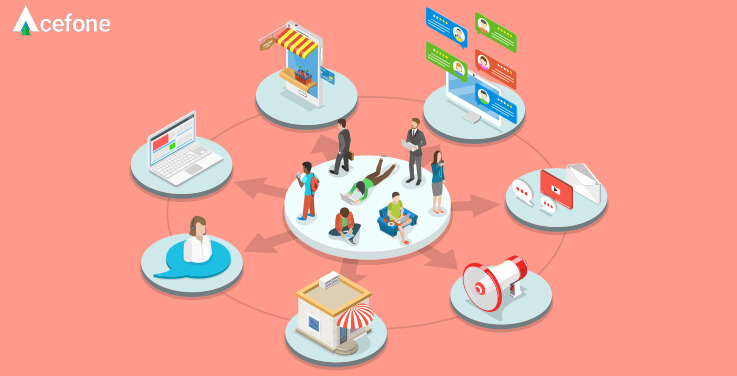Choosing the right business phone number for your company can significantly impact your brand’s accessibility and reach. Indian Businesses often find themselves asking– Should we opt for a toll-free number for business or a local landline number? Understanding the nature, the pros and cons of each number is crucial to make informed decisions that align with your business goals.
What is a Business Toll Free Number?
A toll free number is a business phone number that allows callers to reach a business for zero call charges. When a person dials a toll-free number, the toll-free number owner bears the cost of the call rather than the caller.
Toll free numbers in India begin with the prefix 1800 and are popular as 1800 numbers and 1800 toll free numbers. Businesses commonly use these numbers to facilitate communication with leads, clients, or partners. 1800 numbers let companies offer a free means of calling for customers, irrespective of their location within India.
What is a Local Landline Number?
A local landline number is linked to a specific area or region. Unlike toll free numbers, you can identify local numbers by area codes corresponding to localities.
Local numbers let you build a presence in specific regions and let customers call you without long-distance charges. Businesses targeting specific Indian regions to connect with their audiences often use local landline numbers. It helps them foster a sense of community engagement among their customers.
Pros of 1800 Numbers
1800 Toll free numbers for business offer several advantages:
-Professional Image
They project a professional and established image for the business. 1800 numbers convey a sense of credibility and trustworthiness, which can be crucial in attracting customers.
-National Availability
1800 toll free numbers enable businesses to cater to a nationwide audience. With zero call charges, 1800 numbers encourage customers from across the country to contact them. This expands the business’s reach beyond its local area.
-Easy to Recall
1800 Toll free numbers are easier for customers to remember. For instance, regular numbers like +918843257809 will take longer to be memorized as compared to 1800 numbers like 1800-22-2345. This can lead to increased recall value and have a higher likelihood of customers reaching out to your business.
-Marketing Campaigns
Toll free phone numbers can become a part of a business’s branding strategy. Use of catchy or brand-specific toll free numbers in advertising campaigns can enhance brand recognition and recall value.
-Customer Services
Businesses use toll-free numbers commonly for support helpline. Having a dedicated toll-free line for customer inquiries or support improves customer satisfaction and retention for small businesses.
-Cost-Effective Communication
Toll-free business numbers can encourage more customer engagement for your business. While it enhances engagement, it also potentially increases call volumes and sales inquiries. Choosing a business phone service provider with flexible pricing plans like Acefone can help you manage the increased call volume with ease.
Cons of 1800 Numbers
While toll-free business numbers offer numerous benefits, there are some drawbacks that small business owners must consider:
-Cost to the Business
Toll-free numbers do bring expenses for the owner business. While callers don’t pay for the calls, your business bears the cost of incoming calls. This cost may potentially accumulate during peak seasons because of high inbound call volume.
-Potential Spam & Junk Calls
Toll-free numbers can potentially attract unwanted calls, including spam or non-serious inquiries. Sorting through such calls can consume the agents’ time, impacting their overall productivity.
-Lack of Local Presence
While toll-free numbers facilitate national presence, they might lack the local connection that small businesses desire. This could potentially affect customer relationships in areas where a local touch is crucial.
-Dependency on Toll Free Service Provider
Businesses relying on toll free numbers are dependent on toll free service providers for their functionality and maintenance. Any service interruptions or issues could impact communication with customers.
Pros of Local Landline Numbers
Local landline numbers can be beneficial for small businesses as they let them tailor their services for specific regions. They offer some advantages for small business owners in India, they are:
-Local Connection
Local landline numbers help you establish an intimate presence between you and your target audience. Having a local landline number can make your business more relatable and appealing to local customers within that locality.
-Personalized Approach
Local numbers can convey a more personal touch, fostering stronger connections with customers. It shows the involvement of your business in the local community, which can be a significant selling point for you.
-Geographic Relevance
A local landline number can enhance the relevance and understanding of local needs for small businesses. It helps them target specific local markets and personalize their services according to the local trends.
Cons of Local Landline Numbers
While beneficial in many ways, local landline numbers also come with certain limitations for small business owners:
-Geographic Restriction
Local landline numbers are tied to specific Indian areas because of their area codes. This limitation can slow down businesses looking to expand beyond their local region or cater to a national audience.
-Limited Reach
Small businesses relying strictly on local landline numbers might miss out on national customers, outside their immediate area. This limitation can be a challenge if the business aims to attract a wider customer base.
-Perceived Size
Relying only on a local number might create a smaller, less professional, and outdated impression for your business. This perception might not align with your business’s aspirations or brand image.
-Call Costs for Customers
Local calls within the same area code might not incur additional charges. However, customers outside that area might face long-distance charges, potentially discouraging them from calling.
-Scalability Challenges
If you are planning to expand your business, you might find it cumbersome to do so. Changing your local phone number or getting new local numbers in every area you target can become a challenge.
-Zero Additional Features
Due to the analog nature of landline numbers, there are zero features associated with these numbers, limiting the customer’s communication experience. Simple features such as viewing call forwarding and call waiting are also not supported by landline numbers.
Local Number vs Toll Free: Which is the best for your business?
When it comes to choosing between local vs toll free numbers, you first need to draw a comparison between both. This will help you figure out which one you need based on your company’s requirements.
Here are the key differences:
| Feature | Local Number | Toll-Free Number |
| Purpose | Ideal for targeting customers in a specific city or region | Used for nationwide customer reach and branding |
| Dialing Costs | Callers may incur local or long-distance charges | Free for callers; business pays for inbound calls |
| Area Code | Has a geographic area code (e.g., 212 for NYC, 415 for SF) | Uses toll-free prefixes like 800, 888, 877, 866, etc. |
| Caller Perception | Makes businesses appear local and approachable | Enhances brand credibility and encourages more calls |
| Availability | Limited to a specific region | Can be dialed from anywhere in the country (some restrictions apply) |
| Call Routing | Typically rings at a specific location | Can be routed to different numbers, departments, or locations |
| Best for | Small businesses, local services, and regional operations | Enterprises, customer support centers, and national businesses |
Should You Get an 1800 or Local landline number for Your Business?
The decision to choose between a toll free or local number ultimately depends on your objectives and target audience. While you make your decision, considering the given points can help you choose wisely:
-Business Nature
If your business operates primarily on a larger scale, a toll-free number could be the right choice. On the contrary, if local connections are crucial for your services, a local number might be better.
-Target Audience
Understanding your target demographic is key. If your customers are spread across the country, a toll-free number could enhance accessibility. Conversely, for businesses deeply rooted in a specific community, a local number might foster stronger connections.
-Brand Image
Consider the image you wish to portray. Is your aim to appear larger and more established? Or do you want to emphasize a local and personalized touch.
The Verdict
There is no one-size-fits-all answer. 1800 numbers offer scalability and flexible communication between agents and customers. This feature gives your business a technological advantage, securing your position in the future market. While both options can be beneficial, getting a 1800 toll free number for your business can save you costs exponentially, while giving you access to premium features and unlimited scalability.
Choosing the right business phone number, be it an 1800 toll free number or a local landline number, can significantly impact your customer interactions and overall brand perception. If you wish to get 1800 toll free numbers for your business, feel free to reach out to our experts’ team via calls at 1888 859 0450.
FAQ:
No, your business phone number does not have to match your registered address. With VoIP phone systems, users can often choose their preferred area code when setting up their business number.
Yes, most providers include at least one phone number per account or user, but you can add additional local or toll-free numbers as needed. The cost of extra numbers varies by provider.
To get a toll-free number for your company, follow these steps: Many providers allow you to port an existing toll-free number if you already have one.
Pricing varies by provider, so it’s best to check with your chosen service for specific rates.
The cost of a local phone number depends on various factors, such as:
Yes, many local numbers, especially those provided through VoIP services, support both voice calls and SMS messaging. This is beneficial for customer service and marketing, giving customers the flexibility to communicate in their preferred way.














